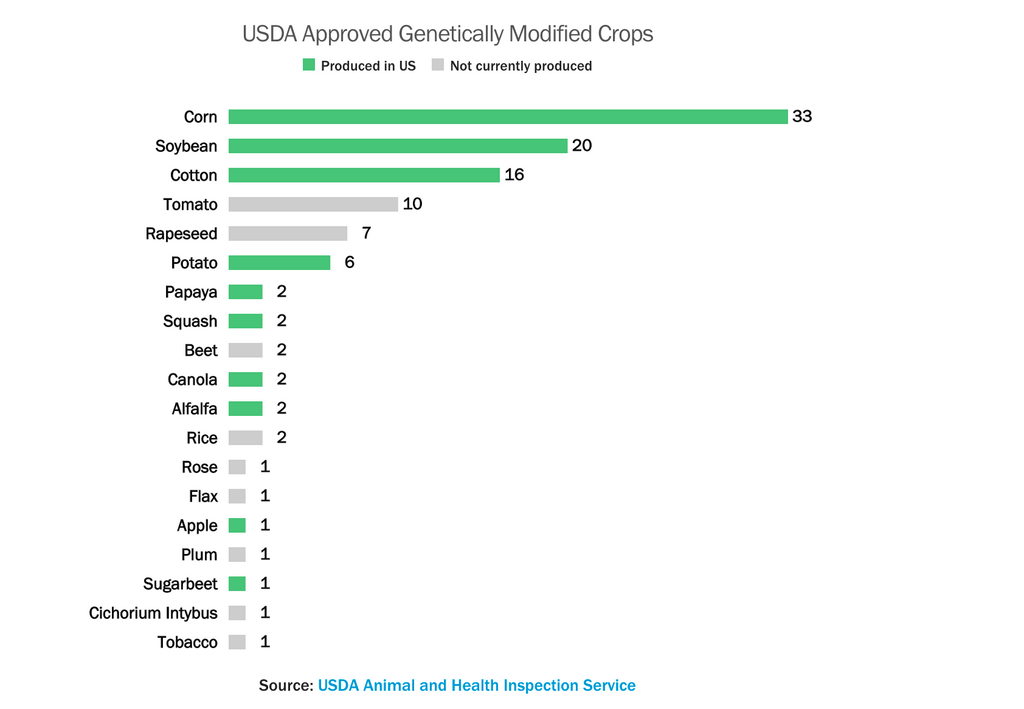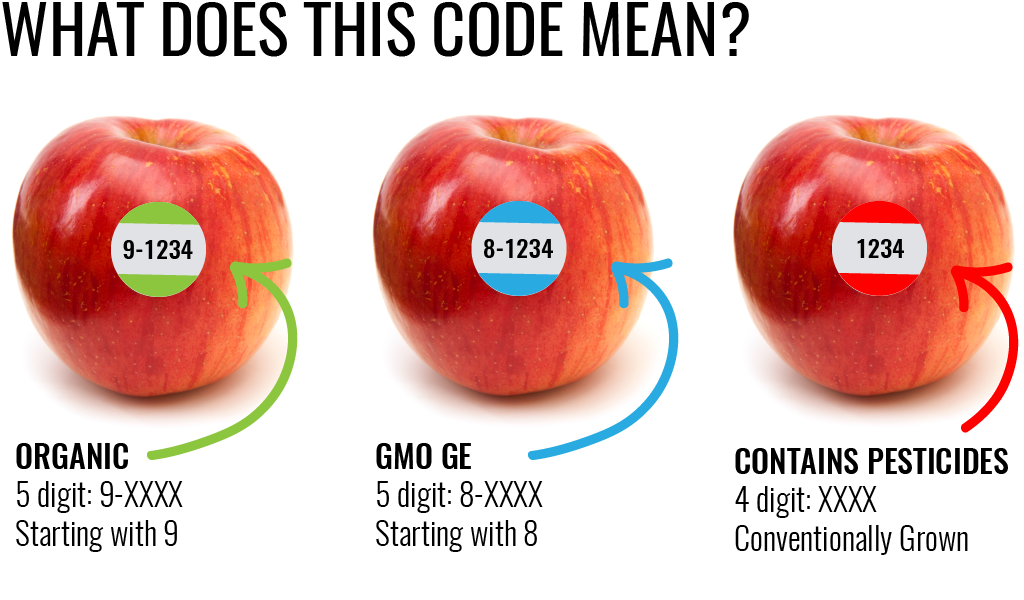
We all want to feed our families foods made with wholesome ingredients free of chemicals and with the highest nutritional value. But in this over-processed world, labels are often confusing and even misleading which makes it hard to choose clean, healthy foods.
One of the main problems we face is Genetically Modified Organisms (GMOs) in our food supply. GMOs are crops that contain genes from one species inserted into the DNA of another (often to withstand toxic herbicides and pesticides). GMO produce has dominated grocery store aisles and infiltrated the refrigerator shelves of the American public for over two decades now. There is growing concern that GMOs may be linked to various health problems. Despite their recent introduction in the mid-1990s, these genetically modified foods are far more pervasive than we think.
Furthermore, even if a food is labeled Non-GMO it might have been sprayed with toxic herbicides and pesticides containing the toxic organophosphate compound glyphosate. There is growing concern that glyphosate wreaks havoc on the human gut, immune system and may be a carcinogen.
Here are the top 7 things I look for so I know exactly what is going into my grocery cart:
1. Identify high-risk foods containing GMOs.
In North America there are 10 GMOs available on the market for consumption: corn, soybean, cotton, tomato, potato, papaya, squash, canola, alfalfa, apple, and sugar beet. Over 90% of land used to grow corn, soybean, cotton is to produce Genetically Engineered (GE) crops. In the grocery store, look for the Non-GMO Project Verified label.
 The Non-GMO Project Shopping Guide is available for Apple and Android devices to help you navigate the world of GMO foods.
The Non-GMO Project Shopping Guide is available for Apple and Android devices to help you navigate the world of GMO foods.

2. Beware of products derived from GMO ingredients.
It is estimated that over 75% of our processed foods contain GMOs. This includes cookies, crackers, sodas, and prepared foods. Look for 100% organic labels in soy products such as soy milk, edamame, and tofu.
Choose 100% extra virgin olive oil vs. oils like Canola oil (aka Rapeseed oil). Not only is olive oil a healthier choice than Canola, it is less likely to be produced by a GMO crop.
Buy 100% cane sugar, over other types of sugar as often GMO sugar beet is added. GMO corn can be found in corn flour, meal, oil, starch, gluten, and a variety of syrups just as Cottonseed oil (aka Vegetable oil) is in shortening and margarine. The best way to avoid these contaminated ingredients is to look for 100% organic labels and cook from scratch whenever you can as Certified Organic requires ingredients to be Non-GMO.
3. Buy Organic Produce.
Many crops that say Non-GMO may still be sprayed with toxic herbicides and pesticides. This is why I look for the Organic labels. Pay attention to the Price Look-up (PLU) numbers on your produce. A four digit code may or may not be organic, since labeling of GMOs is not mandatory in the United States. A five digit code starting with an 8 is GMO and a five digit code starting with a 9 is organic and not genetically modified.

4. Beware of glyphosate in your grains.
Buy organic bread and grains when possible. Because wheat and other grains must be dry before harvest any rain can destroy an entire crop of wheat. To solve this, non-organic wheat, oats, peas, lentils, sunflowers, flax, rye, triticale, buckwheat, peas, millet is often sprayed with toxic herbicides containing glyphosate designed to kill the plant so that it can be harvested immediately. As a result, there is increased scrutiny from the medical community about the potential consequences of glyphosate including: a spike in gluten intolerances, leaky gut syndrome, allergies, and asthma among other health concerns.
5. Beware of the “Natural” label.
Sadly having the word “natural” in front of our food does not mean no artificial ingredients, pesticides, or GMOs are present. According to the FDA in 1993, natural simply means any ingredient, which often include synthetics, “that would not normally be expected in the food.”
6. Look for “Grass-fed, Grass-finished” on meat labels in addition to Non-GMO Project Verified.
 In the case of beef, unlike grass-fed beef, most cows are “finished” at a Concentrated Animal Feeding Operation (CAFO) where mass numbers of animals eat a diet of primarily genetically modified soy, corn, and alfalfa. Hence we need to take care to look for both Non-GMO Project Verified and American Grassfed Association labels on our meat to ensure our meat is also grass-finished.
In the case of beef, unlike grass-fed beef, most cows are “finished” at a Concentrated Animal Feeding Operation (CAFO) where mass numbers of animals eat a diet of primarily genetically modified soy, corn, and alfalfa. Hence we need to take care to look for both Non-GMO Project Verified and American Grassfed Association labels on our meat to ensure our meat is also grass-finished.
Pork and chicken are slightly different in the sense that they need grain in their diet, which is why you need to look for “organic” and “pasture raised” pork, poultry, and eggs so that you and your family are not eating animals who have consumed GMOs in their feed. Lastly, make sure to look for wild-caught fish, as farm-bred fish are likewise served genetically modified grains.
7. Avoid hormones and antibiotics in dairy products by looking for rBGH or rBST Free and antibiotic free labels.
Recombinant Bovine Growth Hormone (or recombinant somatotropin) was originally injected into cows to produce more milk but its popularity is declining due to its potential links to frightening health risks including cancer. Just like in your meat products, most dairy cows are fed a diet of GM feed. To avoid this, once again, look for the grass-fed, organic, and Non-GMO Project Verified labels.
How our food is grown, how it’s processed, and how it’s labeled can have a major impact on the nutrition it gives us. It’s important to remember that by following these tips you’re supporting sustainable farms, protecting the environment, and most importantly, doing the right thing for your family’s health.
Cynthia Mitchell is a certified Registered Nutritional Consulting Practitioner (RNCP). Prior to joining Adena Farms as our in-house nutritionist, Cynthia spent over 20 years working as a nutritionist including partnering with our founder Frank Stronach on his employee health initiative at Magna International.
RELATED
Shop Grass-fed, Grass-finished Beef
Recipe Braised Short Ribs
